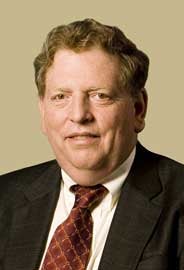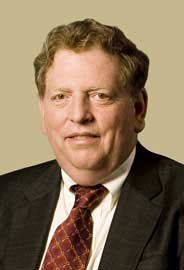 KINGSTON, R.I. — August 15, 2013 — Gerald Sonnenfeld, the vice president of the Clemson University School of Health Research and chief science officer of the Greenville Health System, Clemson, S.C., has been named as the new vice president for research and economic development at the University of Rhode Island. President David M. Dooley made the appointment, which was approved by the Rhode Island Board of Education on August 14, 2013.
KINGSTON, R.I. — August 15, 2013 — Gerald Sonnenfeld, the vice president of the Clemson University School of Health Research and chief science officer of the Greenville Health System, Clemson, S.C., has been named as the new vice president for research and economic development at the University of Rhode Island. President David M. Dooley made the appointment, which was approved by the Rhode Island Board of Education on August 14, 2013.
President Dooley said: “Through his experience as a scientist and his accomplishments as an administrator, Dr. Sonnenfeld (Gerry) has demonstrated his keen knowledge of the processes to increase funding and to leverage university research, innovation and entrepreneurship for greater economic development. His work shows he is a strong supporter of multidisciplinary research and for involving undergraduate and graduate students in research teams. His experience and focus will support our transformational goals and our academic plan.”
When he arrives in October, Sonnenfeld will lead the University’s Division of Research and Economic Development, which includes serving as the chief research officer of the University, as a member of the President’s leadership team, and chairing the Board of the URI Research Foundation. He is charged with providing the vision and strategic planning to develop and enhance the quality and visibility of the University’s research and business development programs.
“Discovery is one of the most important parts of a university experience. It is what makes a research university, like URI, very different from a college,” said Sonnenfeld. “I am excited to see what opportunities can be further developed here and to ensure that every faculty member and every student has an opportunity and the support of the research division. To make sure that URI, which is very competitive now, maintains and enhances its competitiveness we need to be entrepreneurial and think a little differently.”
Sonnenfeld joined Clemson University as vice president for research and professor of biological sciences in 2010. During his tenure he led the initiative to establish a healthcare research powerhouse for both the university and the Greenville Health System. In 2012 he was named vice president of what became the Clemson University School of Health Research and chief science officer of the Greenville Health System.
During his career, Sonnenfeld has been awarded more than $14 million in federal research grants and holds two U.S. patents and one from Canada. His research has focused on the effects of stress on the immune system and resistance to cancer and infection. He was one of the early researchers on the role of interferon-gamma in regulating immune responses. He has directed multiple pre-clinical studies and has been involved in clinical study development for several immunoregulatory agents. Sonnenfeld has also conducted experiments on the U.S. Space Shuttle and on Russian space program satellites.
Before joining Clemson, Sonnenfeld was the vice president for research and professor of biological sciences at Binghamton University, State University of New York. At Binghamton, he was lauded for increased research funding and expenditures. Earlier he had been associate dean for basic sciences and graduate studies at the Morehouse School of Medicine in Atlanta, chaired the Department of Microbiology, Biochemistry and Immunology and the Morehouse School of Medicine Intellectual Property Committee. Earlier in his career, he served as a professor of Microbiology and Immunology at the University of Louisville School of Medicine.
Sonnenfeld received his B.S. in Biology in 1970 from the City College of New York and his Ph.D. in Microbiology and Immunology in 1975 from the University of Pittsburgh School of Medicine. He completed postdoctoral training in infectious diseases and immunology at the Stanford University School of Medicine in 1978.
A native New Yorker, Sonnenfeld is the author of more than 140 peer-reviewed scientific articles, he has written numerous articles and edited two books. He is associate editor of the Journal of Interferon and Cytokine Research and a member of the editorial board of the Immunological Journal and the Journal of Gravitational Physiology. Sonnenfeld and his wife, Elizabeth, have three adult children and five grandchildren.
URI receives nearly $100 million annually in sponsored research and outreach funding in such areas as marine and environmental science, health science and behavior, advanced technologies, and children and family studies.
More about Gerry Sonnenfeld
Sonnenfeld says he first became interested in research as a high school senior taking a class in medical microbiology. This interest, his hard work, and as he says, even just chance led him through years of study and sent his research to outer space.
“My work on space immunology happened by chance — which proved to me that you never know what opportunities may arise. I started my post-doctoral fellowship at Stanford researching the immune system response to infectious diseases and cancer because I was interested in developing treatments. But at that time scientists were just beginning to look into the possibility of cloning, or recombinant DNA technology. As it was believed that a Biosafety Level 4 lab was needed to conduct the research, our proximity and connections to the NASA Ames Research Center led me to become involved in problems of space immunology.
“Twenty-five years later, after experiments on eight Space Shuttle flights and three Russian Biosatellites as well as multiple ground-based simulations, and publishing many reports of the experiments conducted, the notion and import of space immunology research has been established. In fact, I just co-chaired a NASA sub-panel looking at what kind of research should be done on how the immune response in outer space differentially affects women and men.
He’s had a different research career than many scientists, especially immunologists, but he said he never lost track of what he wanted to do and what he wanted to study.

